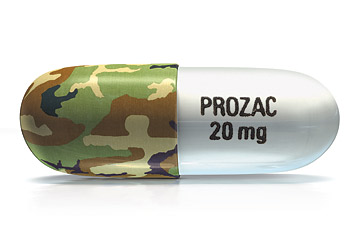
(2 of 3)
Which means that any drug that keeps a soldier deployed and fighting also saves money on training and deploying replacements. But there is a downside: the number of soldiers requiring long-term mental-health services soars with repeated deployments and lengthy combat tours. If troops do not get sufficient time away from combat--both while in theater and during the "dwell time" at home before they go back to war--it's possible that antidepressants and sleeping aids will be used to stretch an already taut force even tighter. "This is what happens when you try to fight a long war with an army that wasn't designed for a long war," says Lawrence Korb, Pentagon personnel chief during the Reagan Administration.
Military families wonder about the change, according to Joyce Raezer of the private National Military Family Association. "Boy, it's really nice to have these drugs," she recalls a military doctor saying, "so we can keep people deployed." And professionals have their doubts. "Are we trying to bandage up what is essentially an insufficient fighting force?" asks Dr. Frank Ochberg, a veteran psychiatrist and founding board member of the International Society for Traumatic Stress Studies.
Such questions have assumed greater urgency as more is revealed about the side effects of some mental-health medications. Last year the U.S. Food and Drug Administration (FDA) urged the makers of antidepressants to expand a 2004 "black box" warning that the drugs may increase the risk of suicide in children and adolescents. The agency asked for--and got--an expanded warning that included young adults ages 18 to 24, the age group at the heart of the Army. The question now is whether there is a link between the increased use of the drugs in the Iraqi and Afghan theaters and the rising suicide rate in those places. There have been 164 Army suicides in Afghanistan and Iraq from the wars' start through 2007, and the annual rate there is now double the service's 2001 rate.
At least 115 soldiers killed themselves last year, including 36 in Iraq and Afghanistan, the Army said on May 29. That's the highest toll since it started keeping such records in 1980. Nearly 40% of Army suicide victims in 2006 and 2007 took psychotropic drugs--overwhelmingly, selective serotonin reuptake inhibitors (SSRIS) like Prozac and Zoloft. While the Army cites failed relationships as the primary cause, some outside experts sense a link between suicides and prescription-drug use--though there is also no way of knowing how many suicide attempts the antidepressants may have prevented by improving a soldier's spirits. "The high percentage of U.S. soldiers attempting suicide after taking SSRIS should raise serious concerns," says Dr. Joseph Glenmullen, who teaches psychiatry at Harvard Medical School. "And there's no question they're using them to prop people up in difficult circumstances."
The Trauma of War
Before the advent of SSRIS--Lilly's Prozac was the first to be approved by the FDA, in 1987, followed by Zoloft from Pfizer, Paxil from GlaxoSmithKline, Celexa from Forest Pharmaceuticals and others--existing antidepressants had many disabling side effects. Impaired memory and judgment, dizziness, drowsiness and other complications made them ill suited for troops in combat. The newer drugs have fewer side effects and, unlike earlier drugs, are generally not addictive or toxic, even when taken in large quantities. They work by keeping neural connections bathed in a brain chemical known as serotonin. That amplifies serotonin's mood-brightening effect, at least for some people.
In 1994 then Major E. Cameron Ritchie, an Army psychiatrist, was among the first to suggest that SSRIS should deploy with Army combat units. In a paper written and published after she returned from a combat deployment to Somalia, Ritchie noted that the sick-call chests used by military doctors "contain either outdated or no psychiatric medications." She concluded, "If depressive symptoms are moderate and manageable, medication may be preferable to medical evacuation."
By 1999, military docs were debating the matter among themselves. Nash, a Navy psychiatrist, wrote that Navy doctors--who also provide Marines with medical care--had "sharp differences of opinion" over letting troops in war zones use SSRIS. Skeptics argued that their "real safety" in combat had not been proved. Supporters countered that their use could "avoid depleting manpower resources and damaging individual careers through unnecessary removals from operational duty." Nash reviewed the medical literature and reported that SSRIS "can be safely administered to deploying and deployed personnel."
The trickle of new drugs became a flood after the invasion of Iraq in 2003. Details of America's medicated wars come from the mental-health surveys the Army has conducted each year since the war began. If the surveys are right, many U.S. soldiers experience a common but haunting mismatch in combat life: while nearly two-thirds of the soldiers surveyed in Iraq in 2006 knew someone who had been killed or wounded, fewer than 15% knew for certain that they had actually killed a member of the enemy in return. That imbalance between seeing the price of war up close and yet not feeling able to do much about it, the survey suggests, contributes to feelings of "intense fear, helplessness or horror" that plant the seeds of mental distress. "A friend was liquefied in the driver's position on a tank, and I saw everything," was a typical comment. Another: "A huge f______ bomb blew my friend's head off like 50 meters from me." Such indelible scenes--and wondering when and where the next one will happen--are driving thousands of soldiers to take antidepressants, military psychiatrists say. It's not hard to imagine why.
Repeated deployments to the war zones also contribute to the onset of mental-health problems. Nearly 30% of troops on their third deployment suffer from serious mental-health problems, a top Army psychiatrist told Congress in March. The doctor, Colonel Charles Hoge, added that recent research has shown the current 12 months between combat tours "is insufficient time" for soldiers "to reset" and recover from the stress of a combat tour before heading back to war.
